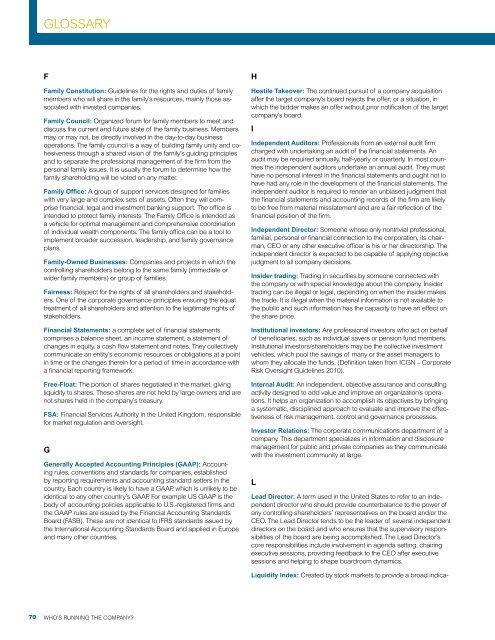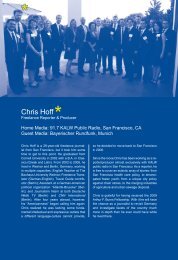Who's Running the Company? - International Center for Journalists
Who's Running the Company? - International Center for Journalists
Who's Running the Company? - International Center for Journalists
You also want an ePaper? Increase the reach of your titles
YUMPU automatically turns print PDFs into web optimized ePapers that Google loves.
GLOSSARY<br />
F<br />
Family Constitution: Guidelines <strong>for</strong> <strong>the</strong> rights and duties of family<br />
members who will share in <strong>the</strong> family’s resources, mainly those associated<br />
with invested companies.<br />
Family Council: Organized <strong>for</strong>um <strong>for</strong> family members to meet and<br />
discuss <strong>the</strong> current and future state of <strong>the</strong> family business. Members<br />
may, or may not, be directly involved in <strong>the</strong> day-to-day business<br />
operations. The family council is a way of building family unity and cohesiveness<br />
through a shared vision of <strong>the</strong> family’s guiding principles<br />
and to separate <strong>the</strong> professional management of <strong>the</strong> firm from <strong>the</strong><br />
personal family issues. It is usually <strong>the</strong> <strong>for</strong>um to determine how <strong>the</strong><br />
family shareholding will be voted on any matter.<br />
Family Office: A group of support services designed <strong>for</strong> families<br />
with very large and complex sets of assets. Often <strong>the</strong>y will comprise<br />
financial, legal and investment banking support. The office is<br />
intended to protect family interests. The Family Office is intended as<br />
a vehicle <strong>for</strong> optimal management and comprehensive coordination<br />
of individual wealth components. The family office can be a tool to<br />
implement broader succession, leadership, and family governance<br />
plans.<br />
Family-Owned Businesses: Companies and projects in which <strong>the</strong><br />
controlling shareholders belong to <strong>the</strong> same family (immediate or<br />
wider family members) or group of families.<br />
Fairness: Respect <strong>for</strong> <strong>the</strong> rights of all shareholders and stakeholders.<br />
One of <strong>the</strong> corporate governance principles ensuring <strong>the</strong> equal<br />
treatment of all shareholders and attention to <strong>the</strong> legitimate rights of<br />
stakeholders.<br />
Financial Statements: a complete set of financial statements<br />
comprises a balance sheet, an income statement, a statement of<br />
changes in equity, a cash flow statement and notes. They collectively<br />
communicate an entity’s economic resources or obligations at a point<br />
in time or <strong>the</strong> changes <strong>the</strong>rein <strong>for</strong> a period of time in accordance with<br />
a financial reporting framework.<br />
Free-Float: The portion of shares negotiated in <strong>the</strong> market, giving<br />
liquidity to shares. These shares are not held by large owners and are<br />
not shares held in <strong>the</strong> company’s treasury.<br />
FSA: Financial Services Authority in <strong>the</strong> United Kingdom, responsible<br />
<strong>for</strong> market regulation and oversight.<br />
G<br />
Generally Accepted Accounting Principles (GAAP): Accounting<br />
rules, conventions and standards <strong>for</strong> companies, established<br />
by reporting requirements and accounting standard setters in <strong>the</strong><br />
country. Each country is likely to have a GAAP, which is unlikely to be<br />
identical to any o<strong>the</strong>r country’s GAAP. For example US GAAP is <strong>the</strong><br />
body of accounting policies applicable to U.S.-registered firms and<br />
<strong>the</strong> GAAP rules are issued by <strong>the</strong> Financial Accounting Standards<br />
Board (FASB). These are not identical to IFRS standards issued by<br />
<strong>the</strong> <strong>International</strong> Accounting Standards Board and applied in Europe<br />
and many o<strong>the</strong>r countries.<br />
H<br />
Hostile Takeover: The continued pursuit of a company acquisition<br />
after <strong>the</strong> target company’s board rejects <strong>the</strong> offer; or a situation, in<br />
which <strong>the</strong> bidder makes an offer without prior notification of <strong>the</strong> target<br />
company’s board.<br />
I<br />
Independent Auditors: Professionals from an external audit firm<br />
charged with undertaking an audit of <strong>the</strong> financial statements. An<br />
audit may be required annually, half-yearly or quarterly. In most countries<br />
<strong>the</strong> independent auditors undertake an annual audit. They must<br />
have no personal interest in <strong>the</strong> financial statements and ought not to<br />
have had any role in <strong>the</strong> development of <strong>the</strong> financial statements. The<br />
independent auditor is required to render an unbiased judgment that<br />
<strong>the</strong> financial statements and accounting records of <strong>the</strong> firm are likely<br />
to be free from material misstatement and are a fair reflection of <strong>the</strong><br />
financial position of <strong>the</strong> firm.<br />
Independent Director: Someone whose only nontrivial professional,<br />
familial, personal or financial connection to <strong>the</strong> corporation, its chairman,<br />
CEO or any o<strong>the</strong>r executive officer is his or her directorship. The<br />
independent director is expected to be capable of applying objective<br />
judgment to all company decisions.<br />
Insider trading: Trading in securities by someone connected with<br />
<strong>the</strong> company or with special knowledge about <strong>the</strong> company. Insider<br />
trading can be illegal or legal, depending on when <strong>the</strong> insider makes<br />
<strong>the</strong> trade. It is illegal when <strong>the</strong> material in<strong>for</strong>mation is not available to<br />
<strong>the</strong> public and such in<strong>for</strong>mation has <strong>the</strong> capacity to have an effect on<br />
<strong>the</strong> share price.<br />
Institutional investors: Are professional investors who act on behalf<br />
of beneficiaries, such as individual savers or pension fund members.<br />
Institutional investors/shareholders may be <strong>the</strong> collective investment<br />
vehicles, which pool <strong>the</strong> savings of many or <strong>the</strong> asset managers to<br />
whom <strong>the</strong>y allocate <strong>the</strong> funds. (Definition taken from ICGN – Corporate<br />
Risk Oversight Guidelines 2010).<br />
Internal Audit: An independent, objective assurance and consulting<br />
activity designed to add value and improve an organization’s operations.<br />
It helps an organization to accomplish its objectives by bringing<br />
a systematic, disciplined approach to evaluate and improve <strong>the</strong> effectiveness<br />
of risk management, control and governance processes.<br />
Investor Relations: The corporate communications department of a<br />
company. This department specializes in in<strong>for</strong>mation and disclosure<br />
management <strong>for</strong> public and private companies as <strong>the</strong>y communicate<br />
with <strong>the</strong> investment community at large.<br />
L<br />
Lead Director: A term used in <strong>the</strong> United States to refer to an independent<br />
director who should provide counterbalance to <strong>the</strong> power of<br />
any controlling shareholders’ representatives on <strong>the</strong> board and/or <strong>the</strong><br />
CEO. The Lead Director tends to be <strong>the</strong> leader of several independent<br />
directors on <strong>the</strong> board and who ensures that <strong>the</strong> supervisory responsibilities<br />
of <strong>the</strong> board are being accomplished. The Lead Director’s<br />
core responsibilities include involvement in agenda setting, chairing<br />
executive sessions, providing feedback to <strong>the</strong> CEO after executive<br />
sessions and helping to shape boardroom dynamics.<br />
Liquidity Index: Created by stock markets to provide a broad indica-<br />
70 WHO’S RUNNING THE COMPANY?
















